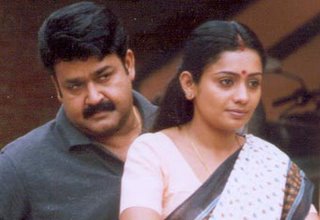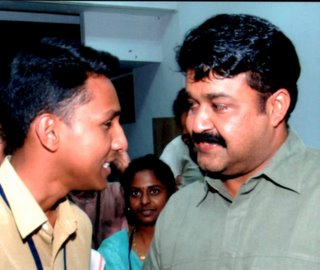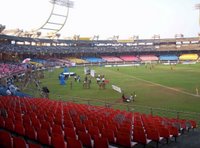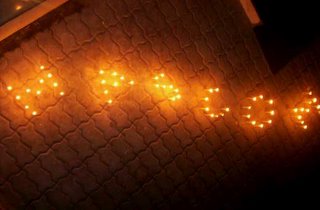Yesterday, for the first time in my life, I drank toddy; ate pork; tasted pan masala; attended a ghazal concert.
"Kumarakom"
When Nishin came up with the idea, I was pretty apprehensive. Already he was in a bad mood; the sky was murky; the destination was a toddy shop.
But Mithun, Prasanth and Srini were ready. So out we went to get the machines and Sanil. Minutes later, we were speeding towards Kumarakom, the backwater village and a popular tourist destination.
Rain had already started when we halted at the petrol bunk at Baker Junction. We went on, racing with the rain. We were sure that it will rain heavily. It was a logical decision to make our way as fast as we can.
It was drizzling though. The road was comparatively narrow. I was in "Watchie’s" (Sanil) Royal Enfield. The six-footer maneuvered the machine with ease.
Then we reached the road parallel to the lake. I have never seen a place where you have boats parallel to your machine. The roadside houses, specially ones in traditional style, were lovely.
We crossed the bridge and reached the rice fields. We could actually see rain coming from a distance. It was really an awesome sight.
In the race with the rain, we reached first. The toddy shop was by the side of the road that went through the paddy fields. Much like any local wayside restaurant.
They ordered pork, chicken, fish and four bottles of toddy as we entered the tatched place. Srini and I were strictly no-no to toddy. I remember Neetha asking me in wonder, "Nee kallu kudikumo?" (Do you drink toddy?).
However, I decided to give a try. Prasanth offered me the glass. I poured half-a-glass and sipped it. It was sour, but was not that awful.
Then came pork. It tasted good, though hot. I needed something hot because my throat was sour, and something spicy would be better, I thought.
Prasanth, as always, was late to finish. Mithun reminded us the belief that after eating, if you let your hands dry, your marriage will be delayed. Sreeni came up with another version that the repercussion will not be a late marriage, but a horrible looking wife!
Within an hour we were on the road, fully drenched in rain.
Back in the hostel, Prasanth offered a little from his pan masala packet. No special taste, though I could feel a particular kind of smell in my breath.
Then we went to listen "Umbayee."
"Umbayee"
"Fragrance of the flowers faded away, all my friends have gone. O! my beloved, when will you come?" I was also translating the lines as I listened in rapt attention to PA Ibrahim, popularly known to Malayalis as Umbayee.
Ghazal, for me, was confined to my tape recorder, television and the bathroom singing sessions. This was the first time I was attending a concert.
I read his biography in a magazine in our library. It was the very first article I read in the institute. I have seen Umbayee in TV, but came to know in detail only after reading the article. And here I was, listening to him.
He gave an introduction in Hindi, with a "madrasi" tinge, but his Urdu was excellent. He began with a song unfamiliar to me, and I began translating.
Ghulam Ali's popular ghazal "Chupke Chupke" was a real surprise. Then came a Malayalam number "Cheruppathil Nammal Randum.." by an unknown writer.
After the programme, when we had a chat with him, he told us that 12 people have contacted him claiming to be the writer of the song!
While coming back, Prasanth commented that liquor and ghazal forms a good combination!
 Thanmatra, the Blessy movie is all about forgetfulness. In his directorial debut Kazhcha, we saw Pavan (Yash Malavya) deprived from his parents. Here, Ramesan (Mohanlal) is deprived of his memories.
Thanmatra, the Blessy movie is all about forgetfulness. In his directorial debut Kazhcha, we saw Pavan (Yash Malavya) deprived from his parents. Here, Ramesan (Mohanlal) is deprived of his memories. 


